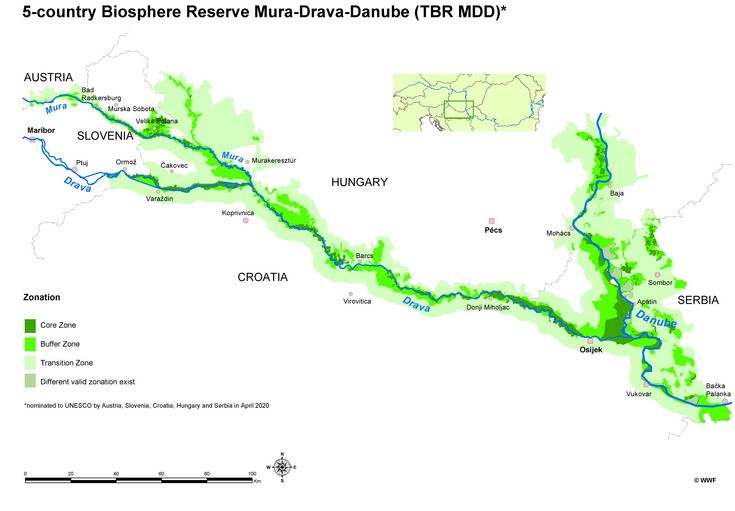Interreg Danube Project lifelineMDD
![[Translate to English:] Interreg Danube Project lifelineMDD](/fileadmin/_processed_/b/c/csm_standard_logo_-_light_green_ink-BIG_4ae7222826.png)
Living rivers, living sediment, living cooperation
Austria, Slovenia, Croatia, Hungary and Serbia submitted a UNESCO application for the world's first 5-country biosphere reserve Mura-Drava-Danube in April 2020. With a total area of 930,000 hectares and a length of 700 kilometres, the wildlife along the Mura, Drava and Danube will become the largest river protection area in Europe.
After successful initial steps towards five-country cooperation between the protected area administrations (Interreg project coop MDD) the Interreg follow-up project lifelineMDD aims to improve the ecological quality of the river corridor and to establish cooperation structures for the future biosphere park. The project was officially launched on 7 July 2020 during an online kick-off.
The coopMDD project has already laid the foundations for lively cooperation between protected area managers and a cross-border management programme for the planned 5-country biosphere reserve Mura-Drava-Danube. lifelineMDD directly ties in with these efforts. The aim of the project is to create a common knowledge base and promote cooperation between different sectors. The basis for all this is the project team, which consists of a mix of different organisations, from universities and nature conservation organisations to authorities and communities from all five countries. The joint goal is to improve connectivity and biodiversity within the MDD river corridor by restoring the natural river dynamics.

Living rivers
The development of the strategic, integrative approach to restore rivers within the planned 5-country biosphere reserve Mura-Drava-Danube is based on scientific studies on fish and river bird populations as well as abiotic conditions resulting from anthropogenic influences on sediment transport and climate. This allows a status quo assessment as a starting point for the establishment of the five-country biosphere reserve as well as the identification of the need for action to improve the status of the river corridor.
Living cooperation
Pilot revitalisation measures lead to a direct and visible, positive effect on river dynamics and on the different habitats within the future 5-country biosphere reserve Mura-Drava-Danube. The implementation of these measures also forms the basis for a cross-sectoral learning process between nature conservation and water management as well as other stakeholders, such as local institutions. Institutional competencies and cooperation between the main actors are thus to be strengthened. Within the framework of the project, different forms of stakeholder involvement and cross-sectoral and transnational cooperation and their possible applications for the future five-country biosphere park will be tested.
Through the active involvement of local communities, the population's attachment to nature and their understanding of the importance of a near-natural river landscape for people and nature will be strengthened. The involvement of NGOs, as well as local and national political levels, ensures the establishment of a long-term active network and the sustainability of the project results.
With the development of an integrative, cross-border strategy for river restoration based on scientific research, pilot measures and cross-sectoral learning, lifelineMDD contributes strongly to the goal of protecting ecological corridors and to intensify the cooperation between different actors.
Over the next 2.5 years, 12 project partners and a further 18 associated, strategic partners from various thematic areas will collaborate to improve biodiversity and restore the natural river dynamics. This is to be achieved through a cross-sectoral partnership and the implementation of revitalisation measures.
Project partners
- World Wide Fund for Nature Austria - WWF Austria, Austria
- University of Natural Resources and Life Sciences, Vienna, Austria
- Regional Management SO, Austria
- Office of the Styrian Government – Department 14 Water Management, Resources and Sustainability, Austria
- Institute of the Republic of Slovenia for Nature Conservation, Slovenia
- Municipality of Velika Polana, Slovenia
- WWF Adria – Association for the protection of nature and conservation of biological diversity, Croatia
- Public institution for management of protected parts of nature in Varaždin County, Croatia
- World Wide Fund for Nature Hungary, Hungary
- World Wide Fund for Nature Adria – Serbia, Serbia
- Institute for Nature Conservation of Vojvodina Province, Serbia
- Pomgrad - water management company, Slovenia
Associated Partners
- International Commission for the Protection of the Danube River, Austria
- Austrian National Committee for UNESCO´s “Man and the Biosphere” Programme, Austria
- Federal Ministry of Agriculture, Regions and Tourism, Directorate I/6 Flood risk management, Austria
- Ministry of the Environment and Spatial Planning, Environment Directorate, Slovenia
- Slovenian Water Agency, Slovenia
- Croatian Waters, Water Management Department for the Mura and Upper Drava Rivers, Croatia
- Public Institution for Management of Protected Natural Areas in the Koprivnica-Križevci County, Croatia
- Ministry of Environment and Energy, Croatia
- Public Institution Nature Park Kopački Rit, Croatia
- West-Transdanubian Water Directorate, Hungary
- South-Transdanubian Water Management Directorate, Hungary
- Balaton-felvidéki National Park Directorate, Hungary
- Deputy State Secretariat for Nature Conservation, Ministry of Agriculture, Hungary
- Public Enterprise "Vojvodinašume" Petrovaradin, Serbia
- Provincial secretariat for urban Planning and Environmental protection, Serbia
- Ministry of Environmental Protection of the Republic of Serbia, Serbia
- Bavarian State Ministry of the Environment and Consumer Protection, Germany
Funding
lifelineMDD project is co-funded through the Danube Transnational Programme of the European Union (ERDF and IPA funds). The project started on 1st July 2020 and lasts until the 31st December 2022. The total budget of the project is 2,987,829.19 €, divided between 12 full partners. WWF Austria as lead partner coordinates the overall project.
For news and updates follow the project on Facebook (#lifelineMDD) or Instagram.
